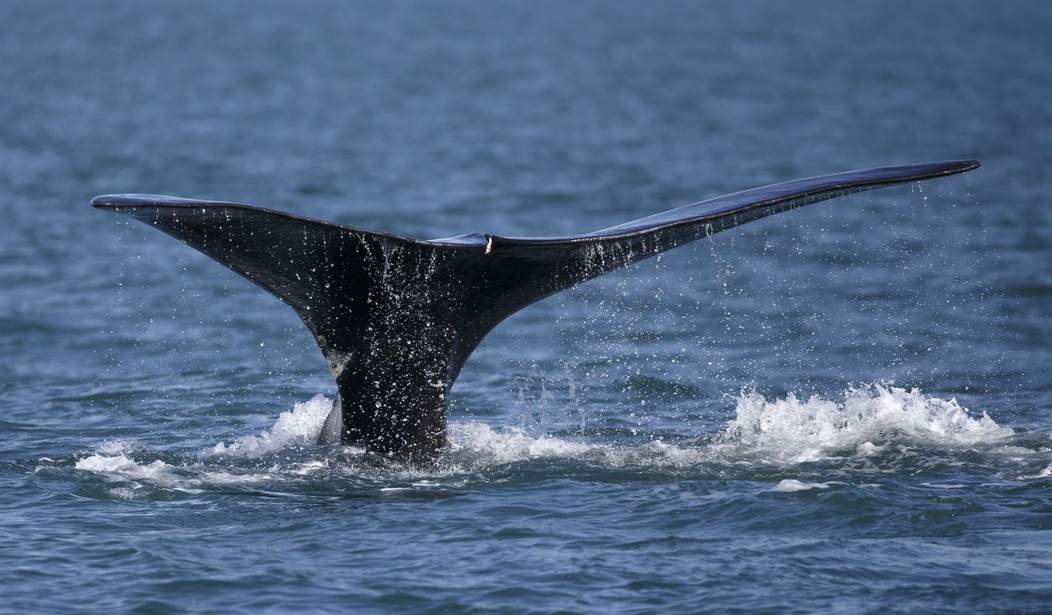When the Biden administration isn’t attacking hunting, it’s setting its sights on recreational fishing and boating.
I’ve extensively written about the Commerce Department’s proposed Atlantic Ocean 11.5 mile-per-hour (MPH) vessel speed rule for upwards of seven months of the year. Supporters claim it’ll “protect” the endangered North Atlantic right whale. But both whales and anglers - commercial and recreational - will suffer from misguided policy making here.
A similar National Oceanic and Atmospheric Administration’s (NOAA) Fisheries rule, filed in May 2021 with even more onerous stipulations, has been proposed in the Gulf of Mexico to protect yet another endangered whale: the newly-identified Rice’s whale with just about 50 known individuals.
NOAA Fisheries recently solicited comments for its proposed “Endangered and Threatened Species; Petition To Establish a Vessel Speed Restriction and Other Vessel-Related Measures To Protect Rice's Whales.” The comment period ended July 6th, 2023.
Who is behind the petition that spurred this rule? Radical preservationist environmental groups - Earthjustice, Natural Resources Defense Council, Center for Biological Diversity, and Defenders of Wildlife -proposed the draft rule to establish a year-around 11 mph slow-down zone stretching from “Pensacola, Fla. to south of Tampa.” These groups, mind you, frequently attack and sue to block lawful hunting on public lands.
The petition also deliberately conflates commercial vessels with recreational ones and would impose unenforceable conditions on recreationists. The rule, if adopted, will bar recreational vessels from hosting overnight offshore trips, mandate observers on all trips in the proposed speed zone, and embolden radical environmentalists to report on “non-compliant” recreational vessels, for instance.
Boating United, a group of leading fishing and boating organizations, lambasted the Biden administration for not consulting them. They also contend there’s no recorded incident involving a recreational vessel hitting a Rice’s whale.
Recommended
“The recreational boating and fishing community is committed to marine wildlife protection and ensuring our cherished waters are safe for wildlife, including the Rice’s whale, and boaters alike. A blanket approach such as vessel speed restrictions covering large swaths of the Gulf will do little to address the protection of the Rice’s whale population and puts recreational boaters, anglers, and communities that rely on economic activity from these industries at risk,” said Frank Hugelmeyer, president of the National Marine Manufacturers Association.
“Once again, proponents of vessel speed restrictions are acting as if small recreational boats are the same as large cargo ships. They are not,” added Jeff Angers, president of the Center for Sportfishing Policy. “We invite NOAA to join with us in identifying 21st Century technological advances that can help tell mariners where whales are instead of effectively barring public access to America’s marine waters.”
“It's impossible for NOAA Fisheries to expect to be able to handle the volume of calls they would receive,“ Captain Dylan Hubbard, co-owner of Hubbard’s Marina in Madeira Beach, Florida, told me on the District of Conservation podcast.
Hubbard also joined Jesse Watters Primetime this week to discuss how the rule would adversely impact the $200 billion Gulf Coast recreational fishery.
He told Fox News, "A lot of people access the fishery — our economy, the whole southeast region is driven by recreational boating — and it's a $214 billion industry, and this has a huge impact proposed, and basically closing an area from 100 to 400 meters deep, or about 300 to 1,300 ft."
Last year, NOAA Fisheries received $82 million from the so-called “Inflation Reduction Act” and Fiscal Year 2023 appropriations funds to expand whale monitoring programs.
"We have high hopes for improving technology, but right this moment we don't have existing technology that can track and monitor and detect and avoid vessel strikes sufficient to prevent the fatalities,” NOAA Assistant Administrator Janet Coit told E&E News.
A bipartisan group of Congressional lawmakers, in turn, drafted a bill to delay funding here until the agency modernizes its north Atlantic right whale monitoring system. Lead sponsors include Rep. Buddy Carter (R-GA) and Rep. Mary Peltola (D-AK).
“Like most of my colleagues, I am concerned about the long-term health of our marine mammal populations, including the North Atlantic Right Whale. This rule, however, has too many potential unintended consequences for small boat operators who need flexibility to maintain their safety at sea. Alaskans know that the ocean is unpredictable; limiting a vessel’s speed can have catastrophic consequences for human life and new regulations should not create additional hazards for our nation’s mariners,” Rep. Peltola said.
Per NOAA Fisheries own Marine Recreational Information Program trip data and vessel registration data, the likelihood of a recreational vessel striking an endangered whale is “less than one in a million.”
If both the Atlantic Ocean and Gulf of Mexico were subjected to these obtuse vessel speed rules, anglers and boaters- key drivers of conservation funding administered by the Dingell-Johnson Amendment - will be displaced from waters.
Basing rulemaking on emotion over science is detrimental to true conservation and has no benefit to marine mammals either.
This wholly unscientific petition must be rejected. Anglers and boaters aren’t the whales’ enemies; preservationist environmentalists and overregulation are.

























Join the conversation as a VIP Member